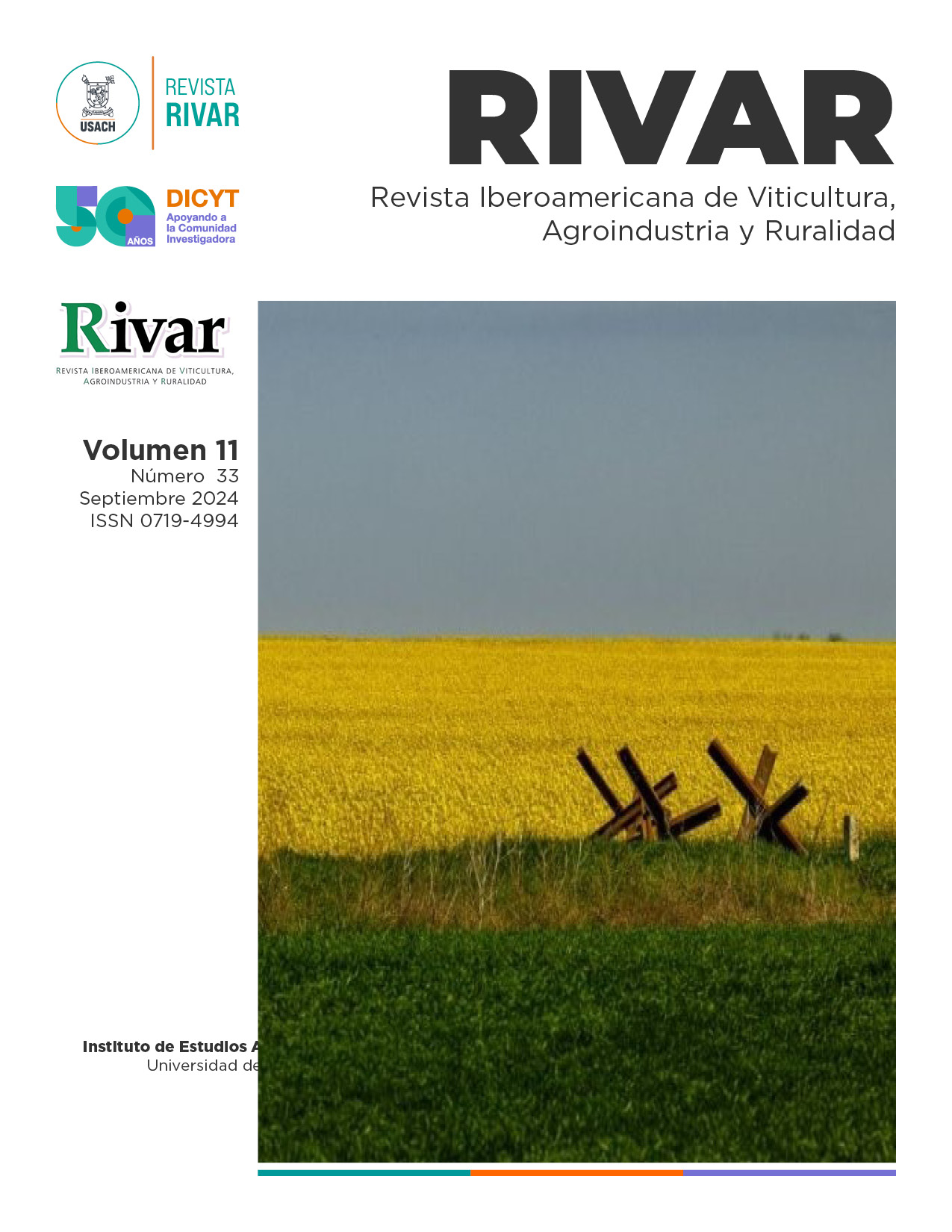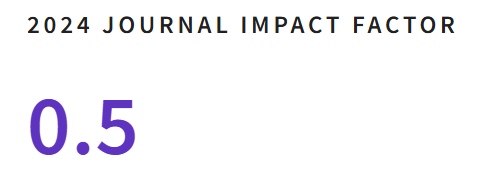Principais resultados da transição à agricultura orgânica na República de Cazaquistão
DOI:
https://doi.org/10.35588/rivar.v11i33.6364Palavras-chave:
agricultural sector, innovation, state management, sustainable development, farmingResumo
Na realidade moderna, os países especializados na venda de produtos agrícolas no exterior são condicionalmente divididos em dois tipos: aqueles que se dedicam principalmente ao cultivo de produtos orgânicos e aqueles que utilizam ativamente fertilizantes e pesticidas sintéticos. A República do Cazaquistão é um dos exemplos de estados que estão a adoptar os princípios da agricultura biológica. Por conseguinte, continua a ser relevante considerar os principais resultados do Cazaquistão no contexto da transição para tais princípios operacionais. O objetivo é mostrar o que a República do Cazaquistão conseguiu em termos de transição para a agricultura biológica e quais são as tendências observadas atualmente na indústria. O trabalho mostrou que o país alcançou alguns indicadores relativos à transição para a agricultura orgânica. Em particular, foram lançadas as bases do quadro legislativo que, em princípio, criou a oportunidade de desenvolver este negócio. No entanto, um número significativo de problemas que impedem o alcance dos objetivos pretendidos na indústria continuam relevantes. A principal delas é a falta de produção nacional no mercado interno do país devido ao complexo processo de certificação.
Downloads
Referências
Beloev, H.I., Stoyanov, K.E., Dimitrov, P.D., Kravchuk, V., Kangalov, P.G., and Marinov, S.Z. (November 12-14, 2020). Study of the Operational Efficiency Indicators of Soil - Protecting Machine - Tractor Aggregates Used for Vertical Mulching by Importing Organic Matter in the Soil. In 2020 7th International Conference on Energy Efficiency and Agricultural Engineering, EE and AE 2020 - Proceedings, 9279006. Institute of Electrical and Electronics Engineers. Ruse, Bulgaria.
Crowder, D.W. and Reganold, J.P. (2015). Financial Competitiveness of Organic Agriculture on a Global Scale. Proceedings of the National Academy of Sciences of the United States of America, 112(24), 7611-7616. https://doi.org/10.1073/pnas.1423674112
Das, S., Chatterjee, A., and Pal, T.K. (2020). Organic Farming in India: A Vision Towards a Healthy Nation. Food Quality and Safety, 4(2), 69-76. https://doi.org/10.1093/fqsafe/fyaa018
Durrer, A., Gumiere, T., Zagatto, M.R.G., Feiler, H.P., Silva, A.M.M., Longaresi, R.H., Homma, S.K., and Cardoso, E.J.B.N. (2021). Organic Farming Practices Change the Soil Bacteria Community, Improving Soil Quality and Maize Crop Yields. PeerJ, 9, e11985. https://doi.org/10.7717/peerj.11985
Ekoconnect (2021). Report on the Situation of Development of Organic Agriculture and Food Industry in Kazakhstan. Ekoconnect. http://www.ekoconnect.org/tl_files/eko/p/Projekte/MOE-Laenderberichte/Stranovoj-otchet-po-organicheskomu-selskomu-xozjajstvu-Kazaxstana-EkoConnect-2021.pdf
FAO (2015). On the Approval of the Rules for Maintaining the Register of Producers of Organic Products. FAO. https://faolex.fao.org/docs/pdf/kaz161070R.pdf
Grigoruk, V.V. and Ayulov, A.M. (2019). Ecological and Economic Conditions in Kazakhstan for Growing Crops Using Organic Technologies. Human Science: Studies in the Humanities, 4(38), 223-229.
Home, R., Indermuehle, A., Tschanz, A., Ries, E., and Stolze, M. (2019). Factors in the Decision by Swiss Farmers to Convert to Organic Farming. Renewable Agriculture and Food Systems, 34(6), 571-581. https://doi.org/10.1017/S1742170518000121
Karabassov, R., Nurmaganbetov, K., Aidynov, Z., Orynbekova, G., and Khapova, A. (2022). The Main Areas of Development of Organic Agriculture in the Republic of Kazakhstan. Scientific Horizons, 25(9), 105-116. https://doi.org/10.48077/scihor.25(9).2022.105-116
Meemken, E.V. and Qaim, M. (2018). Organic Agriculture, Food Security, and the Environment. Annual Review of Resource Economics, 10, 39-63. https://doi.org/10.1146/annurev-resource-100517-023252
Nasiyev, B., Bushnev, A., Zhanatalapov, N., Bekkaliyev, A., Zhylkybay, A., Vassilina, T., Shibaikin, V., and Tuktarov, R. (2022). Initiation of Safflower Sowings in the organic farming system of Western Kazakhstan. Oilseeds & Fats Crops and Lipids, 29, 34-46.
Reddy, A.A., Melts, I., Mohan, G., Rani, C.R., Pawar, V., Singh, V., Choube, Y.M., Vashishtha, T., Suresh, A., and Bhattarai, M. (2022). Economic Impact of Organic Agriculture: Evidence from a Pan-India Survey. Sustainability, 14(22), 15057. https://doi.org/10.3390/su142215057
Republic of Kazakhstan (2015). On the Production of Organic Products. Law of the Republic of Kazakhstan. https://online.zakon.kz/Document/?doc_id=37002307&pos=3;-108#pos=3;-108
____. (2017a). Organic Products. National Mark of Conformity for Organic Products. Technical Requirements and Procedure for Labelling Organic Products. Standard of the Republic of Kazakhstan 3109-2017. Republic of Kazakhstan. https://online.zakon.kz/Document/?doc_id=32713286&pos=3;-106#pos=3;-106
____. (2017b). Conformity Assessment. Requirements for Bodies to Confirm the Conformity of the Production of Organic Products and Organic Products. Standard of the Republic of Kazakhstan 3110-2017. Republic of Kazakhstan. https://online.zakon.kz/Document/?doc_id=37876843
____. (2017c). Organic Products. Requirements for the Production Process. Standard of the Republic of Kazakhstan 3111-2017. Republic of Kazakhstan. https://online.zakon.kz/Document/?doc_id=34797135
Samenbetova, D.S. and Patlasov, O.Y. (2022). Model of State Support for Organic Farming of Kazakhstan in the Context of Creation of International Regulatory Framework for the Industry. BIO Web of Conferences, 42, 06004. https://doi.org/10.1051/bioconf/20224206004
Shahini, E., Shehu, D., Kovalenko, O., and Nikonchuk, N. (2023). Comparative Analysis of the Main Economic and Biological Parameters of Maize Hybrids that Determine their Productivity. Scientific Horizons, 26(4), 86-96. https://doi.org/10.48077/scihor4.2023.86
Smith, O.M. et al. (2019). Organic Farming Provides Reliable Environmental Benefits but Increases Variability in Crop Yields: A Global Meta-analysis. Frontiers in Sustainable Food Systems, 3. https://doi.org/10.3389/fsufs.2019.00082
Znaor, D., Pretty, J., Morrison, J., and Todorovic, S.K. (2005). Environmental and Macroeconomic Impact Assessment of Different Development Scenarios to Organic and Low-input Farming in Croatia. University of Essex.









